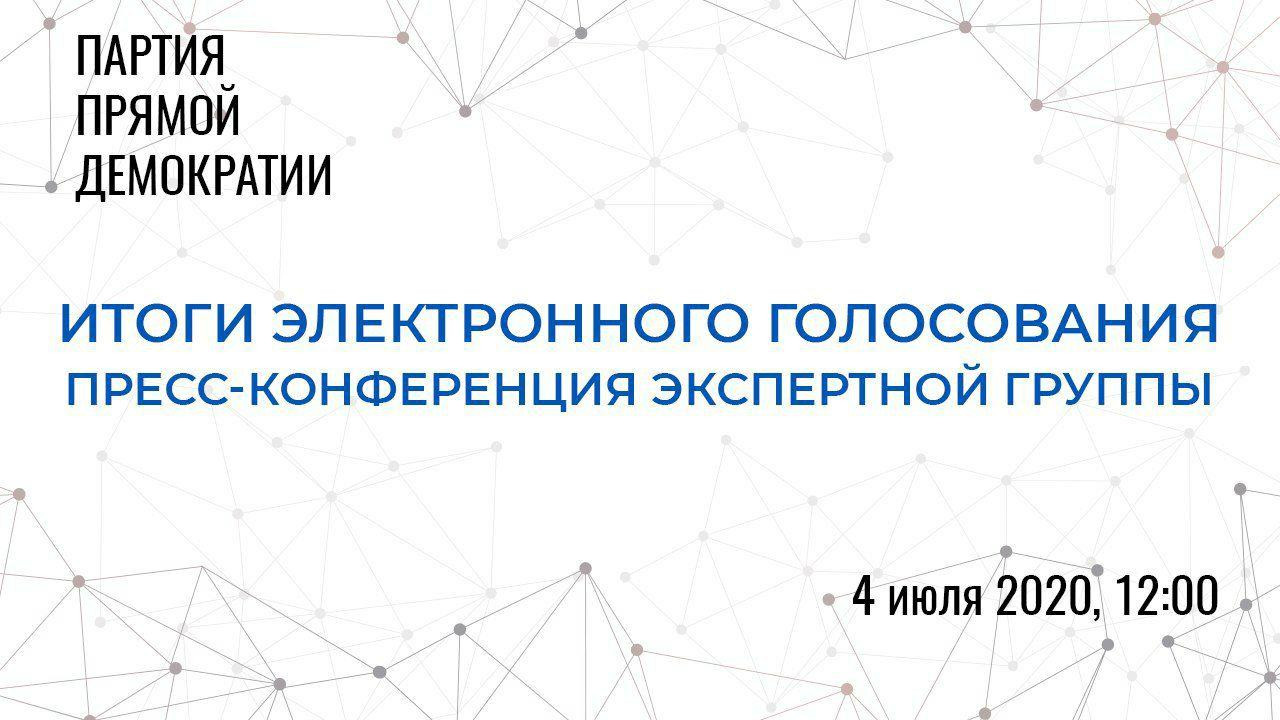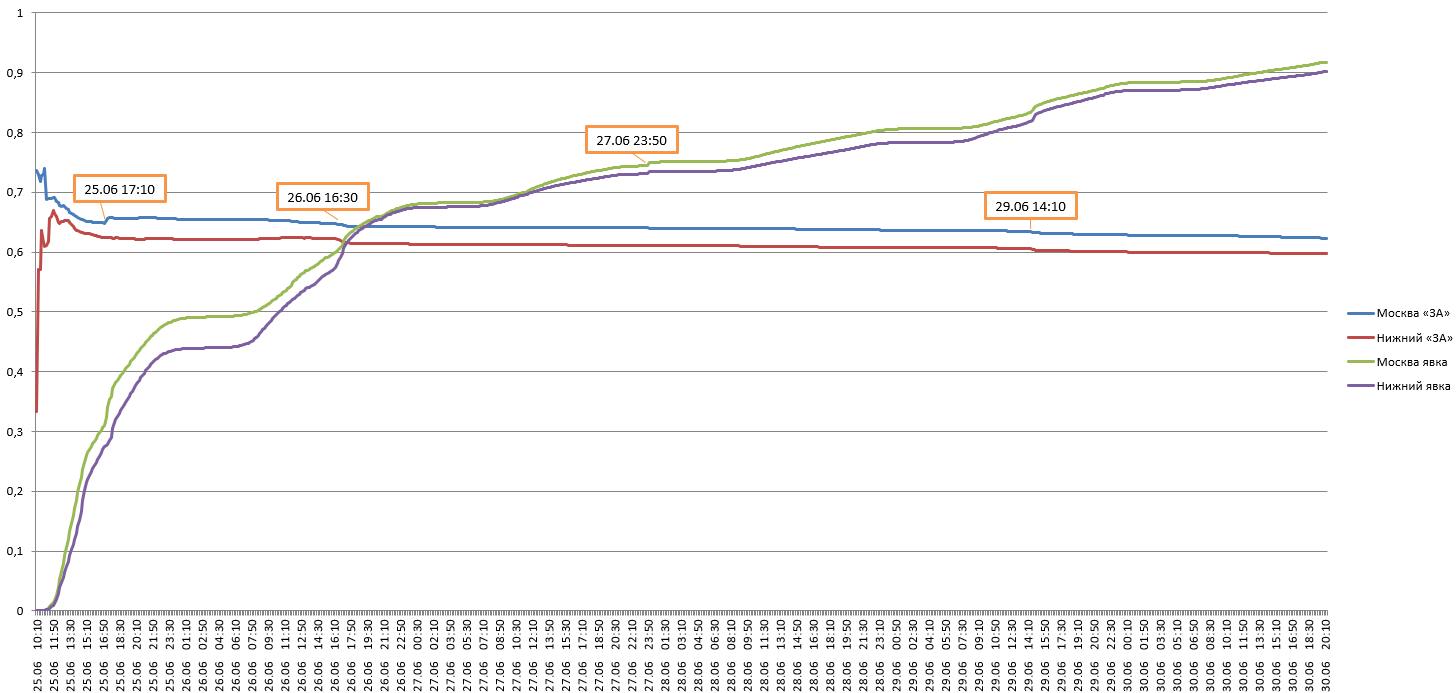As you all know, this week was essentially the first truly large-scale electronic voting in Russia - on amendments to the Constitution. It took place only in two regions, Moscow and Nizhny Novgorod, but at the same time it attracted 1.2 million voters (mainly in Moscow, where 15% of the total number of voters voted electronically).
Formally, it took place in the territorial election commission of remote electronic voting (TEC DEG), in reality, of course, we worked remotelyexcept for celebrations at the beginning and end. We worked there in two capacities at once: firstly, the official observers at the DEG TEC from the Public Chamber of the Russian Federation, and secondly, the expert working group. This combination is very successful: firstly, it sometimes allows not only asking, but also demanding, and secondly, if the official status of an observer is available to the elite, then we could introduce people to the expert group at our own discretion.

Now we are preparing a large report on the voting progress, questions and comments that have arisen, as well as suggestions for the future, and we also expect from DIT Moscow to completely unload all blockchain transactions (not only the votes cast, they have already been downloaded) and statistics on Rabbit MQ queues, in which the data could have been, sometimes a significant time, before entering the blockchain.
However, a full report is a lot of time and effort, so in order to start sharing observations and considerations now, tomorrow, July 4, at 12:00 Moscow time, we will hold an online press conference on the results of the voting .
Details below, as a bonus - a list of theses that we compiled by the working group on the last day of electronic voting.
So, first - the announcement.
Results of electronic voting. Press conference of the expert group
Saturday, July 4, 12:00 Moscow time
At the voting on amendments to the Constitution that ended this week, the Direct Democracy Party not only acted as observers from the Public Chamber of the Russian Federation in the territorial election commission of remote electronic voting (TEC DEG), but also formed an expert a group for monitoring the progress and results of voting.
At the press conference, we will talk about how the electronic voting took place, what problems it faced, whether its results can be trusted, as well as what steps need to be taken to further develop and apply DEG in Russia, including at the regional elections in autumn 2020 and Duma in autumn 2021. Experts on electoral systems, blockchain, cryptographic systems and information security will talk about the situation with the DEG.
The broadcast will be available on the Direct Democracy Party's YouTube channel .
Questions to speakers can be asked in the comments to the broadcast or through the party's Telegram channel.
Expert group members:
- Oleg Artamonov , member of the VKS of the Direct Democracy Party, observer at the TEC DEG
- Mona Arkhipova , independent expert, co-founder and chief operating officer of the Interregional Information and Settlement Center
- Alexander Isavnin , independent expert, member of the Pirate Party of Russia
- Vyacheslav Makarov , secretary general of the All-Union Forces of the Direct Democracy Party, observer at the TEC DEG
- Sergey Nesterovich , independent expert, deputy editor-in-chief of the Political News Agency
- Alexander Podshivalov , independent expert, member of the Direct Democracy Party
- Timofey Shevyakov , press secretary and member of the Videoconferencing Party of the Direct Democracy Party
- Alexey Shcherbakov , independent expert, co-author of the report by Roman Yuneman “Electronic voting. Risks and vulnerabilities "
Invited guests:
- Andrey Larin , head of the DEG project, DIT Moscow
- Yuri Maksimov , Doctor of Economics, Ph.D., Professor of Moscow State University, Advisor to the Deputy Chairman of the State Duma of the Russian Federation, member of the Liberal Democratic Party
As you can see, the line-up is extremely interesting. First, Slava Makarov and I will speak at the press conference as official observers, and then we will give the floor to each of the experts and guests present. We did not agree on the topics and content of their speeches in advance, so even for me they are still a mystery (although, of course, roughly I imagine that Mona is unlikely to be about blockchain, and Alexey - about IDS).
A little about the voting process
We have not yet drawn up all the materials and have not accompanied them with comments, but we can show the basic metrics of the system's operation right now - as you all remember, at the voting in MHD in 2019, technical problems were so outrageous that other problems were lost against their background.
This time everything happened much, much more interesting.
Firstly, the data on the turnout and votes "for", on unloading from the already decrypted blockchain: Already from this graph it is clear that there were no significant failures, absolutely normal dynamics is visible. I will note a few points:

- this is an unloading from the blockchain, it does not take into account queues in Rabbit MQ
- the turnout is not quite correctly calculated on the chart - it does not take into account the ballots issued but not received back, there were about 1.7%
- : 25.06 17:10, 26.06 16:30 29:06 14:10 , , , —
- , — , , , ,
- 27.06 , ; — Rabbit MQ
I will also put a PDF file with a report on the blockchain operation here . These are working sketches based on data from the DIT of Moscow, I hope by the middle of next week we will present a more detailed and detailed report, with numbers and comments.
Conclusion and theses
Preliminary peer group abstracts are available on Google Docs .
The abstracts were drawn up for the press briefing of the Public Chamber of the Russian Federation on June 30, but they have not lost their relevance.
As it is easy to see, they go far beyond the topic of the technical performance of the system and affect organizational, informational and legislative issues. In general, I can say that this time we are grateful to the DIT of Moscow for the stable operation of the DEG system - at least it allowed us to distract ourselves from the discussion “how many bulletins the blockchain chewed and spat out” and focus on a wider range of tasks.
Total
We are looking forward to all those interested tomorrow at the press conference, where we will give the floor to each of the experts of the working group - because even within the working group, of course, there is no absolute unity of opinion, not to mention that different experts have different specializations.
YouTube: https://youtu.be/PAhFGnLDBjI
PS If you are a press representative and want to participate directly in Zoom, with the opportunity to ask questions, write to me directly in Habré or in Telegram olartamonov.
Upd. Selected quotes and shorter video clips.